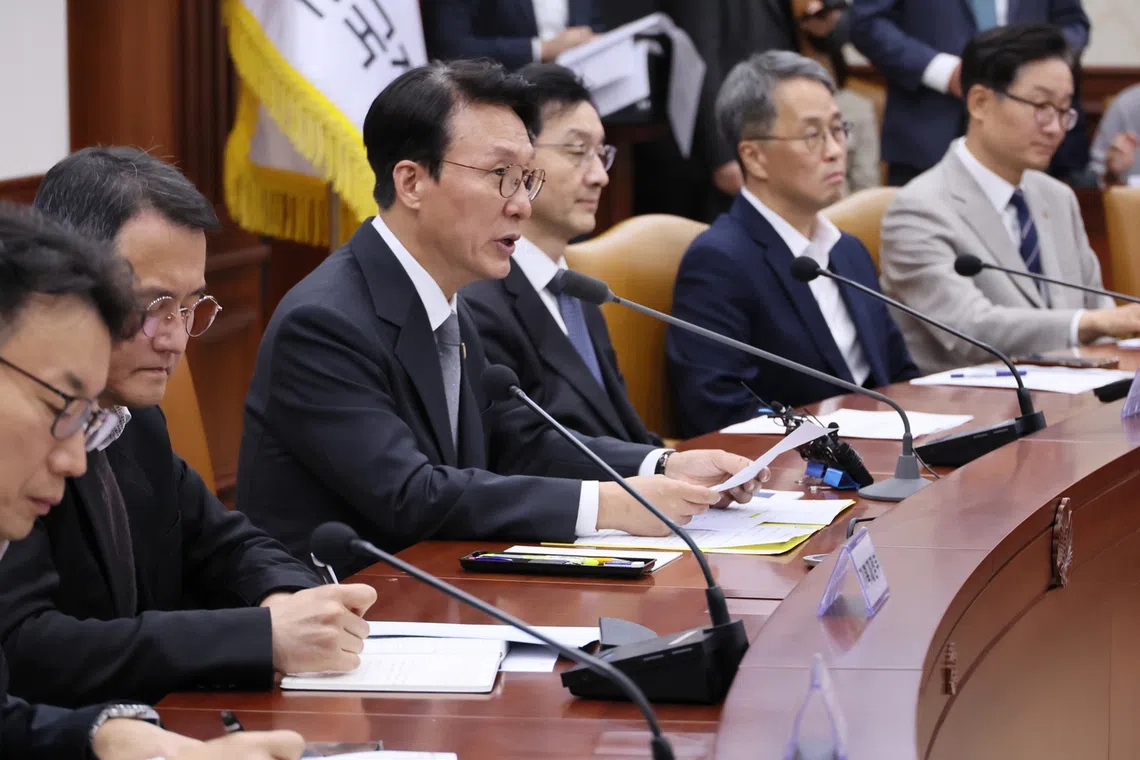South Korea kicks off martial law probe into 49 government ministries, agencies
Sign up now: Get insights on Asia's fast-moving developments

South Korean PM Kim Min-seok's Prime Minister's Office will spearhead the central task force.
PHOTO: THE KOREA HERALD
Follow topic:
SEOUL - Scores of government task forces investigating potential misconduct by officials tied to the Dec 3 martial law declaration formally began operations on Nov 24, with investigations launched into 49 government ministries and agencies.
The launch of the sweeping probes has sent ripples of unease through the civil service. Many government officials fear that the push for visible results could lead to the creation of scapegoats and drive the civil service deeper into a defensive crouch.
The main opposition People Power Party has denounced the initiative and opened its own hotline to report what it calls “unconstitutional surveillance and illegal acts targeting public officials”.
Addressing mounting concerns, Prime Minister Kim Min-seok underscored that “principle and restraint are critical” in conducting investigations by the “Constitutional Compliance and Government Reform” task forces, speaking at the meeting on Nov 24, which was attended by the full roster of working-level officials responsible for each task force.
“The task force’s activities must be limited to intentional and active conduct directly related to the insurrection and, within the set period, must be carried out as swiftly as possible and strictly in a non-public manner until completion, while adhering to lawful procedures that respect human rights,” Mr Kim said.
“Any task force activities and members that fail to exercise restraint will be addressed immediately,” added Mr Kim, who is the head of the Prime Minister’s Office which spearheads the central task force.
The task forces essentially aim to take disciplinary measures against officials implicated in the martial law declaration made by former President Yoon Suk Yeol, amid delays in the special counsel’s probe into the matter.
Each task force aims to determine the scope of conduct subject to investigation by Dec 12, complete its review by the end of January and announce follow-up measures by Feb 13, ahead of the Lunar New Year holiday.
The inquiry covers a 10-month window from six months before to four months after the Dec 3 declaration.
A total of 48 task forces are currently in operation, with the Office for Government Policy Coordination and the Prime Minister’s secretariat jointly running one. The task forces mobilise 661 personnel, including 536 officials from government bodies and 125 external experts such as legal professionals, according to the Prime Minister’s Office on Nov 24.
Among them, 12 agencies have been designated for intensive inspection, including the Joint Chiefs of Staff, the prosecution, the police, and the ministries of Foreign Affairs, National Defence, Economy and Finance, Justice, Interior and Safety, and Culture, Sports and Tourism.
“We plan to determine which parts still need to be verified, in addition to what has been investigated so far and what is currently under investigation by the special counsel, and we will investigate those areas,” Mr Lee Kyung-ho, acting spokesperson for the Defence Ministry, said on Nov 24, referring to the task force comprising 53 personnel and led by Defence Minister Ahn Gyu-back.
Mr Lee further explained that the ministry “will additionally accept tip-offs”, referring to an “Insurrection Reporting Centre” that will operate across ministries and agencies until Dec 12.
Asked whether the task force has the authority to access government-issued computers or documents, Mr Lee answered that “the investigation will proceed strictly within the scope authorised by regulations”.
Building anxiety in the civil service is rooted in memories of the Moon Jae-in administration, when sweeping internal investigations placed many officials under scrutiny – including those who had simply followed administrative directives under the Park Geun-hye administration, regardless of whether those directives were linked to alleged misconduct.
Working-level officials at the Foreign Ministry were questioned about why they had followed those directives, and their government-issued phones were seized. The experience cemented the belief that taking such initiatives can carry risks – a view that still fuels a culture of caution and inaction.
Despite the Lee administration’s clarification, the way the process is unfolding has already heightened concerns.
The Prime Minister’s Office’s earlier announcement that investigative tools will include digital forensics – and that disciplinary action is possible for officials who refuse to submit personal phones – has added to the unease.
Worries have also grown over the task force’s external advisory panel – composed of four experts in the military, police, legal and personnel fields – all of whom are widely regarded as being aligned with the ruling Democratic Party.
At the Foreign Ministry, the timing of the probe has intensified concerns about personnel disruption.
Senior headquarters appointments are tied to ambassadorial postings, and with all special envoys recalled in June, about 40 of the nation’s 172 overseas missions have been without ambassadors or consuls general for five months. Officials fear the diplomatic vacuum could persist if already-delayed personnel decisions slow further during the investigation.
Still, some officials speaking to The Korea Herald on condition of anonymity said this probe could unfold differently.
One said there was cautious expectation that the review will remain narrowly focused on actions directly tied to the martial law declaration, rather than the broad, open-ended scrutiny seen under the Moon administration. THE KOREA HERALD/ASIA NEWS NETWORK

